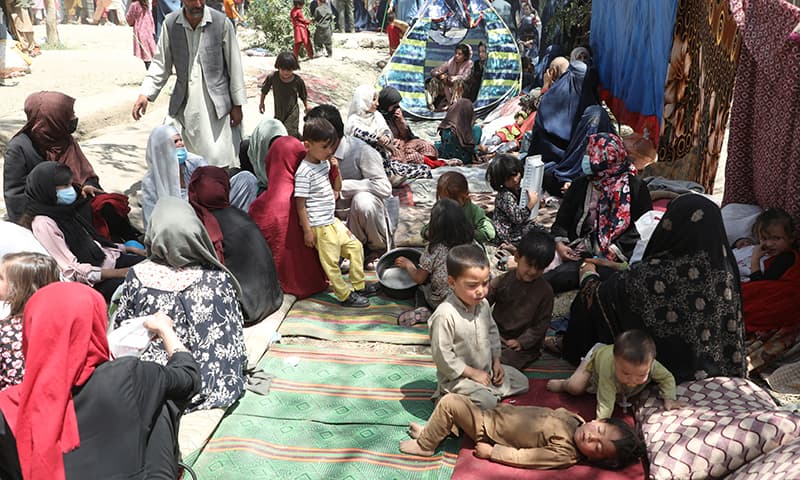Taliban insurgents tightened their grip on captured Afghan territory on Tuesday as civilians hid in their homes, and a European Union official said the militants now control 65 per cent of the country after a string of gains as foreign forces pull out.
President Ashraf Ghani called on regional strongmen to support his government, while a UN official said advances made in human rights in the 20 years since the hardline Islamists were ousted from power were in danger of being erased.
In the capital Kabul, Ghani's aides said he was seeking help from regional militias he has squabbled with over the years to rally to the defence of his government. He had also appealed to civilians to defend Afghanistan's “democratic fabric”.
In the town of Aibak, capital of Samangan province on the main road between the northern town of Mazar-i-Sharif and Kabul, Taliban fighters were consolidating their control, moving into government buildings, residents said.
Most government security forces appeared to have withdrawn.
“The only way is self-imposed house arrest or to find a way to leave for Kabul,” said Sher Mohamed Abbas, a provincial tax officer, when asked about living conditions in Aibak.
“But then even Kabul is not a safe option anymore,” said Abbas, the sole bread-winner for a family of nine.
Abbas said the Taliban had arrived at his office and told workers to go home. He and other residents said they had neither seen nor heard fighting on Tuesday.
For years, the north was the most peaceful part of the country with only minimal Taliban presence. The militants' strategy appears to be to take the north, as well as the main border crossings in the north, west and south, and then close in on Kabul.
The Taliban, battling to defeat the US-backed government and reimpose strict Islamic law, swept into Aibak on Monday meeting little resistance.
Taliban forces now control 65pc of Afghan territory, are threatening to take 11 provincial capitals and are trying to deprive Kabul of its traditional support from national forces in the north, a senior EU official said on Tuesday.
The government has withdrawn forces from hard-to-defend rural districts to focus on holding major population centres.
The United States has been carrying out air strikes in support of government troops but said it was up to Afghan forces to defend their country. “It's their struggle,” John Kirby, a Pentagon spokesperson, told reporters on Monday.
'Deeply disturbing reports'
Taliban and government officials have confirmed that the insurgents have overrun six provincial capitals in recent days in the north, west and south.
Security forces in Pul-e-Khumri, capital of Baghlan province, to the southeast of Aibak, were surrounded as the Taliban closed in on the town at a main junction on the road to Kabul, a security official said.
Gulam Bahauddin Jailani, head of the national disaster authority, told Reuters there was fighting in 25 of the 34 provinces and 60,000 families had been displaced over the past two months, with most seeking refuge in Kabul.
About 400,000 Afghans have been displaced in recent months and there has been an increase in numbers of people fleeing to Iran over the past 10 days, the EU official said.
Six EU member states warned the bloc's executive against halting deportations of rejected Afghan asylum seekers arriving in Europe despite major Taliban advances, fearing a possible replay of a 2015-16 crisis over the chaotic arrival of more than one million migrants, mainly from the Middle East.
A resident of Farah, the capital and largest city of Farah province in western Afghanistan near the border with Iran, said the Taliban had taken the governor's compound and there was heavy fighting between Taliban and government forces.
Civilians said the Taliban had captured all key government buildings in the city.
UN human rights chief Michelle Bachelet said reports of violations that could amount to war crimes and crimes against humanity were emerging, including “deeply disturbing reports” of the summary execution of surrendering government troops.
“People rightly fear that a seizure of power by the Taliban will erase the human rights gains of the past two decades,” she said.
The Taliban, ousted in the weeks after the September 11, 2001, attacks on the United States, appeared to be in a position to advance from different directions on Mazar-i-Sharif. Its fall would deal a devastating blow to Ghani's government.
Atta Mohammad Noor, a northern militia commander, vowed to fight to the end, saying there would be “resistance until the last drop of my blood”.
“I prefer dying in dignity than dying in despair,” he said on Twitter.
India sent a flight to northern Afghanistan to take its citizens home, officials said, asking Indians to leave. The US and Britain have already advised their citizens to leave Afghanistan.
The US will complete the withdrawal of its forces at the end of this month under a deal with the Taliban, which included the withdrawal of foreign forces in exchange for Taliban promises to prevent Afghanistan being used for international terrorism.
The Taliban promised not to attack foreign forces as they withdraw but did not agree to a ceasefire with the government.














































